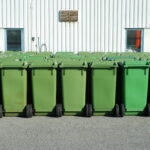This spring, many food service businesses temporarily closed or began operating at a reduced capacity, disrupting the local and regional food system. With fewer commercial and institutional outlets for food products, farms, manufacturers, distributors, and other entities along the supply chain are finding themselves with surplus food. At the same time, food rescue organizations that…
The U.S. Environmental Protection Agency (EPA) recently recognized four Massachusetts entities with 2019 Food Recovery Challenge (FRC) awards. The Food Recovery Challenge is a voluntary program for organizations and businesses to implement strategies to reduce food waste in their operations in alignment with the Food Recovery Hierarchy. If your organization is not already a Food…
As restaurants and wholesalers adjust their operations due to COVID-19, wholesalers and distributors have been left with existing inventories of perishable food. To keep up with changing practices, some Massachusetts food wholesalers and distributors that normally serve businesses are setting up direct-to-consumer home delivery to move their supply of fresh produce and other foods. Boston.com…
Many Massachusetts food service businesses are working to reduce waste to help them cut costs, limit excess inventory, and comply with the Massachusetts Department of Environmental Protection’s commercial organics waste ban. These efforts are more important than ever as business and institutions recalibrate in response to COVID-19 related closures and disruptions. The Boston Globe recently…
As restaurants, event spaces, and other businesses with food service options experience restrictions and closures due to COVID-19, many end up with surplus food in their inventory. Rather than discard it, businesses and institutions can connect with local food rescue organizations. WWLP recently included another unique outlet for food donation – the Zoo in Forest…
Recent restrictions and closures due to COVID-19 may leave your business or institution with excess food in your inventory. Whether you are a restaurant, college or university, supermarket, or other business, consider donating your surplus, edible food to the local community rather than throwing it away. Many food rescue organizations are currently able to distribute…
On November 14, UMass Dartmouth hosted RecyclingWorks in Massachusetts (RecyclingWorks), the Massachusetts Department of Environmental Protection (MassDEP), and the US Environmental Protection Agency (EPA) for the 2019 Fall WasteWise Forum. This year’s fall forum focused on reducing contamination in recycling collection programs and using technology to reduce food waste. Below is a summary of the day’s highlights. Welcome and Updates The…
The Massachusetts Department of Environmental Protection (MassDEP) has released the Draft 2020-2030 Solid Waste Master Plan. The plan proposes aggressive goals for waste reduction, building on the 18 percent reduction in disposal per capita achieved from 2008 to 2018. MassDEP has developed and implemented extensive programs since releasing the previous Solid Waste Master Plan in…
Colleges and universities across Massachusetts continue to seek new strategies to recover wasted food. WWLP recently reported that Westfield State University has partnered with the Springfield organization Rachel’s Table to donate its excess food to families in need. Rachel’s Table, a program of the Jewish Federation of Western Massachusetts, facilitates the donation of food to…
NBC News recently reported on the Food for All mobile app that allows users to buy discounted, leftover food from participating local restaurants. As a result of daily demand fluctuations, restaurants and cafes often find themselves with excess food at the end of the business day. To help prevent this food from going to waste,…

